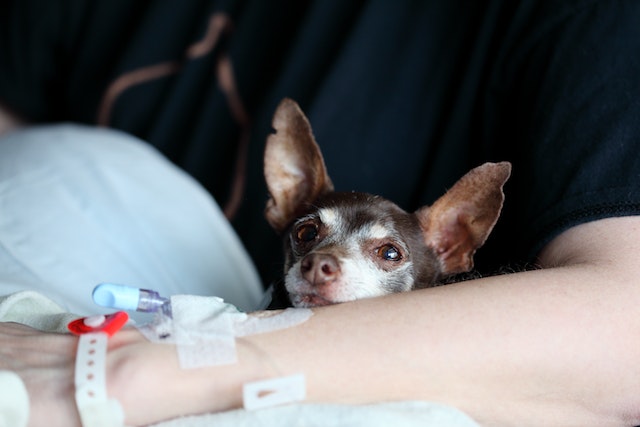11 Common Health Problems for Chihuahuas & Tips

Hey there, Chihuahua lovers! Are you the proud owner of a tiny but feisty Chihuahua? Do you want to make sure your furry little friend is healthy and happy for years to come?
Well, you’ve come to the right place! Today, we’re diving into the world of Chihuahua health and discussing some common health problems these spunky pups can face.
So grab a cup of coffee, sit back, and let’s explore how to keep your pint-sized pooch feeling their best!
Common Health Problems for Chihuahuas
The following are some of the most common health problems for Chihuahuas:
1. Eye Problems

Eye problems are common health concerns in Chihuahuas. One of the most common eye problems is tear staining, which is characterized by dark reddish-brown stains under the eyes.
This is caused by overactive tear glands that are unable to drain properly, leading to irritation and discoloration in the fur around the eyes.
Another common eye problem in Chihuahuas is corneal ulcers, which can be caused by injuries to the eye or infections.
Dry eyes or Keratoconjunctivitis Sicca is another eye issue.
Symptoms include redness, squinting, and discharge from the eyes. It is important to seek veterinary attention if your Chihuahua displays any of these symptoms.
To prevent eye problems, regular cleanings and grooming around the eyes can help keep the area clean and dry. Proper nutrition and weight control can also prevent obesity-related eye problems.
Treatment for eye problems in Chihuahuas depends on the specific condition and severity. Corneal ulcers may require antibiotics or even surgery in severe cases. Tear staining can be managed through regular cleaning and the use of tear stain removal products.
Overall, it is important to monitor your Chihuahua’s eye health and seek veterinary attention if any symptoms arise. Regular preventive care can also help reduce the risk of developing eye problems in the first place.
2. Hydrocephalus
Hydrocephalus is a common health problem found in Chihuahuas. It is a condition where there is an accumulation of cerebrospinal fluid in the brain, which causes the ventricles to become enlarged.
This can lead to increased pressure on the brain and, in severe cases, can be fatal.
The causes of hydrocephalus in Chihuahuas can be genetic or acquired. Genetic hydrocephalus is due to a mutation that is inherited from the parents.
Acquired hydrocephalus can be due to other conditions such as a tumor, infection, or injury.
Symptoms include a dome-shaped head, seizures, difficulty walking, and changes in behavior.
Early diagnosis is important since treatment can improve outcomes. A veterinarian can diagnose hydrocephalus using imaging techniques.
Prevention is difficult since genetic hydrocephalus cannot be prevented. However, with acquired hydrocephalus, prompt treatment of any underlying condition can help.
Treatment typically involves draining the excess fluid from the brain using surgery or by using a shunt to drain the fluid into other parts of the body.
3. Hypoglycemia
Hypoglycemia is a relatively common health problem in Chihuahuas, which is defined as low blood sugar concentration.
Chihuahuas, particularly young puppies, are susceptible to this condition due to their small size and high metabolism.
Symptoms of hypoglycemia in Chihuahuas may include weakness, lethargy, confusion, seizures, and even coma in severe cases.
To prevent hypoglycemia, it is important to feed Chihuahuas frequently throughout the day with high-quality nutrition and keep their blood sugar levels stable.
Treatment for hypoglycemia in Chihuahuas involves providing them with a source of glucose, such as honey or corn syrup, and immediate veterinary care if necessary.
It is always best to contact a veterinarian for specific advice tailored to your Chihuahua’s medical history and individual needs.
4. Congestive Heart Failure
Congestive Heart Failure (CHF) is one of the most common health problems in Chihuahuas.
The disease occurs when the heart is no longer able to pump blood effectively, leading to fluid buildup in the lungs and other tissues.
Symptoms of CHF in Chihuahuas include coughing, difficulty breathing, lethargy, decreased appetite, and exercise intolerance.
CHF can be caused by a variety of factors, including heart valve disease, heartworm disease, and arrhythmias.
Prevention of CHF in Chihuahuas involves maintaining a healthy weight, providing regular exercise, and administering heartworm prevention medication.
Treatment for CHF in Chihuahuas typically involves medication to improve heart function and manage fluid buildup, as well as dietary changes to improve heart health.
In severe cases, surgical intervention may be necessary. Regular veterinary check-ups can help detect early signs of CHF, improving the chances of successful treatment and management of the disease.
5. Tracheal Collapse
Tracheal Collapse is one of the common health problems in Chihuahuas. It is a progressive, chronic condition affecting the trachea, which is the windpipe that carries air from the nose and mouth to the lungs.
The causes of tracheal collapse are not yet fully understood, but it is believed to be a combination of genetic and environmental factors.
Symptoms of tracheal collapse may include coughing, wheezing, difficulty breathing, and exercise intolerance. In severe cases, the dog may collapse and struggle to breathe.
The best way to prevent this condition is to maintain a healthy weight, avoid smoke and other irritants, and provide adequate exercise.
Treatment options vary depending on the severity of the condition but may include medication, surgery, or a combination of both.
Your veterinarian will discuss the various treatment options and create a plan that is tailored specifically to your Chihuahua’s needs.
6. Dental problems

Dental problems, particularly dental disease, are one of the most common health issues found in Chihuahuas, affecting up to 80% of all dogs.
Poor dental hygiene can lead to tartar buildup, gingivitis, periodontitis, and oral infections that can cause tooth loss, bad breath, pain, and even spread throughout the body.
Symptoms of dental problems in Chihuahuas include difficulty chewing, drooling, bleeding gums, and tooth loss.
To prevent dental problems, Chihuahuas should be provided with proper dental care that includes regular teeth brushing, professional teeth cleaning, and dental-friendly diets and treats.
In severe cases, treatment may require tooth extraction or surgery. It is also important to maintain a healthy weight and lifestyle for your Chihuahua as obesity can increase the risk of dental and other health problems.
7. Luxating patella
Luxating patella, or kneecap dislocation, is a common health problem in Chihuahuas and other small-breed dogs.
The condition occurs when the kneecap slides out of its normal position, causing pain and difficulty walking.
Symptoms may include limping, lameness, and difficulty bearing weight on the affected leg.
The causes of Luxating patella in Chihuahuas are usually genetic in nature, although trauma or injury can also be a contributing factor.
Obesity is also a risk factor for Luxating patella, as it places additional stress on the joints.
To prevent Luxating patella, it is important to maintain a healthy weight in the dog and to avoid over-exercising them.
Providing regular veterinary check-ups can detect and address any potential issues before they become a serious problem.
Treatment for Luxating patella may include medication, physical therapy, or surgery. In some cases, therapy may be enough to address the issue, but surgery may be necessary for more severe cases.
The type of surgery will depend on the severity of the condition and may involve realignment of the kneecap, reconstruction of the joint, or other procedures.
8. Lower Respiratory Tract Disorder
Lower respiratory tract disorders are common in Chihuahuas. These disorders include pneumonia, bronchitis, and other respiratory infections.
They can be caused by viruses, bacteria, allergens, or other irritants. Symptoms of lower respiratory tract disorders include coughing, wheezing, difficulty breathing, and fatigue.
The best way to prevent lower respiratory tract disorders is to keep your Chihuahua’s environment clean and free of irritants.
Avoid exposing your Chihuahua to second-hand smoke, dust, and other airborne pollutants. Ensure your Chihuahua gets regular checkups and vaccinations from a veterinarian.
If your Chihuahua has a lower respiratory tract disorder, treatment may involve antibiotics, anti-inflammatory medications, or other medications prescribed by a veterinarian to alleviate symptoms.
In severe cases, oxygen therapy or hospitalization may be necessary. Overall, regular checkups, vaccinations, and a clean environment are key to preventing and treating lower respiratory tract disorders in Chihuahuas.
9. Obesity

Obesity is a common health problem in Chihuahuas that can lead to a range of other health issues, such as heart disease, diabetes, and arthritis.
It occurs when a dog consumes more calories than it burns off through activity and exercise. The main cause of obesity in Chihuahuas is overfeeding and lack of exercise.
Symptoms of obesity in Chihuahuas include excessive weight gain, difficulty breathing, lethargy, and difficulty walking or running.
To prevent obesity, it is important to feed Chihuahuas a well-balanced diet and ensure they get enough exercise. Treats should also be given in moderation, and table scraps should be avoided.
The treatment of obesity in Chihuahuas involves a combination of a healthy diet and exercise. High-quality dog food that is low in fat and calories can be used, and portion sizes should be carefully controlled.
Exercises, such as walks, playtime, and interactive toys, can be increased gradually until the Chihuahua is getting enough activity to maintain a healthy weight.
10. Bladder stones and kidney stones
Bladder stones and kidney stones are among the common health problems that Chihuahuas may face.
Bladder stones are crystal formations that occur in the bladder, while kidney stones form in the kidneys.
The causes of both types of stones are similar and may include genetic predisposition, mineral imbalances, infections, and diet.
Symptoms of bladder stones and kidney stones may include blood in the urine, painful urination, frequent urination, and straining to urinate.
In severe cases, dogs may experience bladder or kidney obstruction, which can be life-threatening.
Prevention measures include ensuring a balanced and appropriate diet, providing plenty of clean water, and encouraging frequent urination.
Treatment may involve dietary changes, medication, surgery, or a combination of these.
If you suspect that your Chihuahua is experiencing bladder stones or kidney stones, it is important to consult your veterinarian for proper diagnosis and treatment.
Learn more about why your Chihuahua is shaking.
11. Seizures
Seizures are one of the common health problems seen in Chihuahuas and can occur due to several reasons such as epilepsy, kidney or liver disease, electrolyte imbalances, head injury, brain tumors, and genetic factors.
Symptoms of seizures in Chihuahuas include uncontrollable shaking or twitching, loss of consciousness, and convulsions.
To prevent seizures, it is crucial to keep your Chihuahua healthy by ensuring a healthy diet, regular exercise, and proper grooming routines.
Ensure your Chihuahua’s environment is safe as head injuries can cause seizures.
Treatment for seizures in Chihuahuas involves symptomatic treatment with medication prescribed by a veterinarian.
It is advisable to seek veterinary care immediately if your Chihuahua experiences seizures.
Learn more about dealing with a stressed Chihuahua.
Signs Your Chihuahua is Sick

Here are some common signs that your Chihuahua may be sick:
- Loss of appetite: If your Chihuahua is not eating their regular meals or refusing to eat at all, it can be a sign of illness.
- Lethargy: If your Chihuahua is unusually tired or less active than usual, it may be a sign of sickness or pain.
- Vomiting: Consistent vomiting, especially if accompanied by other symptoms, can be a sign of underlying illness.
- Diarrhea: Loose or bloody stools can be a sign of gastrointestinal problems or infections.
- Coughing: If your Chihuahua has a persistent cough, it may be a sign of respiratory issues or heart problems.
- Sneezing: Occasional sneezing is normal, but consistent sneezing can be a sign of allergies or upper respiratory infections.
- Excessive drinking or urinating: Increased thirst and frequent urination can be a sign of diabetes or kidney problems.
- Skin problems: Skin irritations, rashes, or excessive hair loss can be indicative of allergies or skin infections.
- Behavioral changes: If your Chihuahua is suddenly behaving differently, such as increased aggression or anxiety, it may be a sign of an underlying issue.
If you notice any of these signs in your Chihuahua, it is important to take them to the vet promptly for a proper diagnosis and treatment.
It’s always better to be safe than sorry when it comes to your pet’s health.
Learn more about identifying a sick Chihuahua.
Ways to keep your Chihuahua healthy

Here is a list of general tips for keeping your Chihuahua healthy:
- Regular visits to the veterinarian: Chihuahuas require regular check-ups to ensure they are healthy. It’s important to take them to the vet at least once a year, or more often if they have underlying health issues.
- Feeding a balanced diet: Chihuahuas have small stomachs, so their meals should be small, frequent, and consist of a balanced diet. You should feed them high-quality dog food that is specifically designed for small-breed dogs.
- Regular exercise: Chihuahuas are an active breed, and they require daily exercise. Regular walks and playtime can help keep their weight in check and keep their energy levels up.
- Grooming: Chihuahuas have a short coat, but they still require regular grooming. Brushing their coat regularly helps keep their coat shiny and free of tangles.
- Dental care: Chihuahuas are prone to dental problems, so it’s important to brush their teeth regularly and get them dental checkups.
- Parasite prevention: Fleas, ticks, and heartworm are common problems that can affect dogs. Make sure your Chihuahua is current on their vaccinations and takes regular medication to prevent parasites.
- Training and socialization: Good training and socialization can help prevent behavior problems and keep your Chihuahua healthy, caring, and happy.
- Clean living environment: A clean living environment can help prevent illnesses and infections. Make sure your Chihuahua’s bedding, toys, and bowls are clean and disinfected regularly.
- Pay attention to signs of illness: As a dog owner, it’s important to be aware of your dog’s behavior and watch out for signs of illness. If you notice any changes in your Chihuahua’s behavior, appetite, or energy levels, take them to the vet immediately.
These are just general tips, and you should always consult with your veterinarian for specific advice tailored to your Chihuahua’s individual needs.
Learn more about keeping your dog healthy.
Conclusion
In conclusion, while Chihuahuas may be tiny in size, their health problems are anything but small.
As responsible pet owners, it’s important to stay informed about the common health issues that affect these adorable pups, from dental problems to heart disease.
By taking preventative measures, keeping up with regular vet visits, and providing a healthy diet and exercise routine, we can help our beloved Chihuahuas live their happiest and healthiest lives possible.
Always remember, a little bit of care goes a long way! Learn more about identifying a dying Chihuahua.
